Amid Global Demand for Oil, Gulf Coast Town Grapples With Plans for Offshore Export Terminal
By Keaton Peters
Reporting Texas
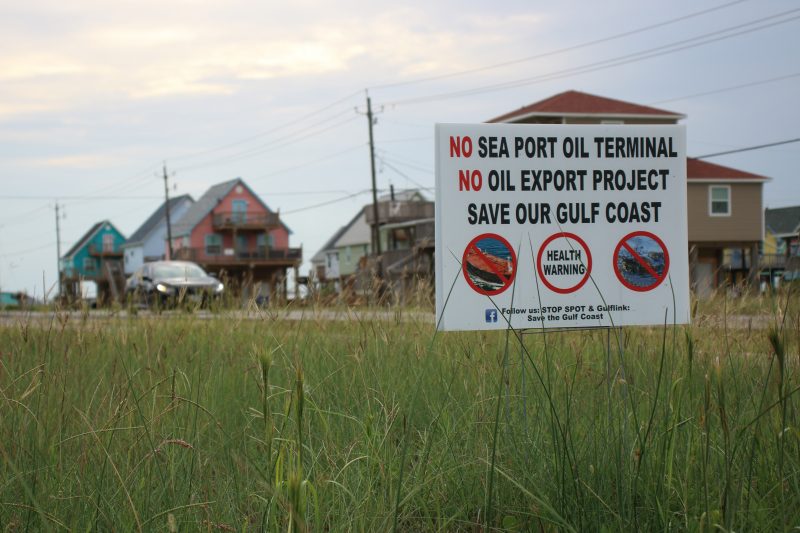
A sign placed by community activists marks the site where a crude oil pipeline will pass through the town of Surfside Beach, Texas. Keaton Peters/Reporting Texas
Crossing Texas 332, blinking refineries and chemical plants dominate the skyline before giving way to the ocean view across the bridge from the city of Freeport to the village of Surfside Beach.
“We are on island time, so don’t expect us to be in a hurry,” Surfside Beach head of tourism Michelle Booth said during the village’s Nature Fest event in October.
About 600 residents call the Southeast Texas island home, but most of the properties are rented out, making Surfside a destination for family vacations, Booth said.
The seemingly laid-back island has found itself at the forefront of oil industry expansion, as a plan to build the Sea Port Oil Terminal, known as SPOT, has divided the community.
The plan includes building an oil pipeline from Harris County through Brazoria County, across vacant lots in the village of Surfside Beach and connecting to a deepwater port 27 nautical miles offshore.
The construction project is one of six new permit applications for offshore terminals in the Gulf of Mexico to export oil or natural gas to the global market. The permit for the Sea Port Oil Terminal has received more than 37,000 public comments, and a final decision on permit approval is expected this month from the U.S. Maritime Administration.
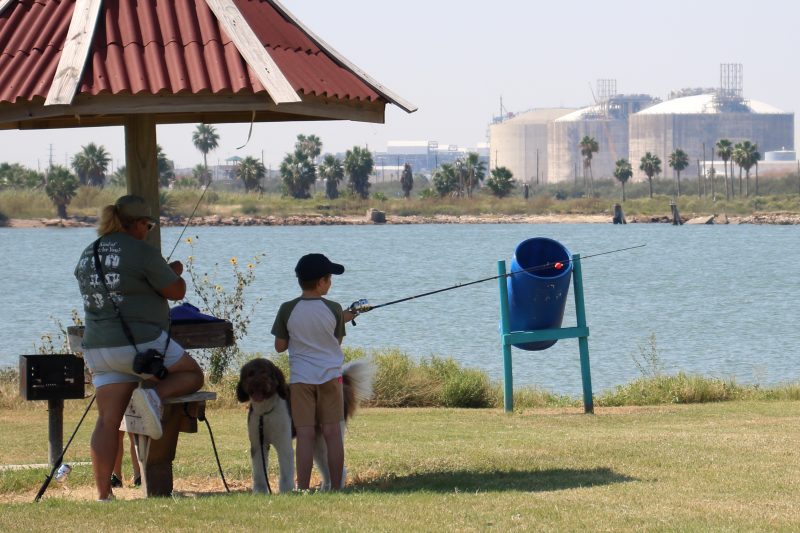
Liquified natural gas storage tanks on the right sit near a recreation area in Surfside, Texas. Residents opposed to the new oil terminal say there are already too many oil and gas related facilities around their town. Keaton Peters/Reporting Texas
Energy expert and University of Houston lecturer Ed Hirs explained that since President Barack Obama ended an oil and gas export ban in 2015, oil companies can rake in profits by selling Texas oil to foreign refiners rather than having to build more refineries in the U.S., which is a long and expensive process.
If approved, the Sea Port Oil Terminal will carry an estimated 2 million barrels of crude oil per day from the Permian Basin to fill the industry’s largest oil-carrying ships, called VLCCs, according to Mark Wilson, a former alderman for the village of Surfside Beach.
Wilson recently retired from a career as a senior research and development scientist at the Dow Chemical plant in Freeport, and he touted the “upstream jobs” the sea port would create. He said executives from Enterprise, one of the companies behind SPOT, told him the terminal will generate $6.4 billion in revenue per year for Enterprise and its SPOT partners Chevron and Enbridge.
“You’ve got to look all the way from the well to the tank to the pipeline to the VLCC. It’s a supply chain thing and creating jobs,” Wilson said.
Enterprise declined to comment on how many permanent full-time jobs the project would create in Brazoria County, and Wilson could only guess.
The project has drawn attention from environmental groups such as the Center for Biological Diversity, Sierra Club and Earthjustice, who submitted comments against permit approval.
In a joint comment, the three organizations said, “The project will lock in decades of fossil fuel dependence and infrastructure and pollute Gulf communities already at the frontlines of climate disaster.”
Many residents of Surfside Beach are also unhappy with the pipeline going through their village.
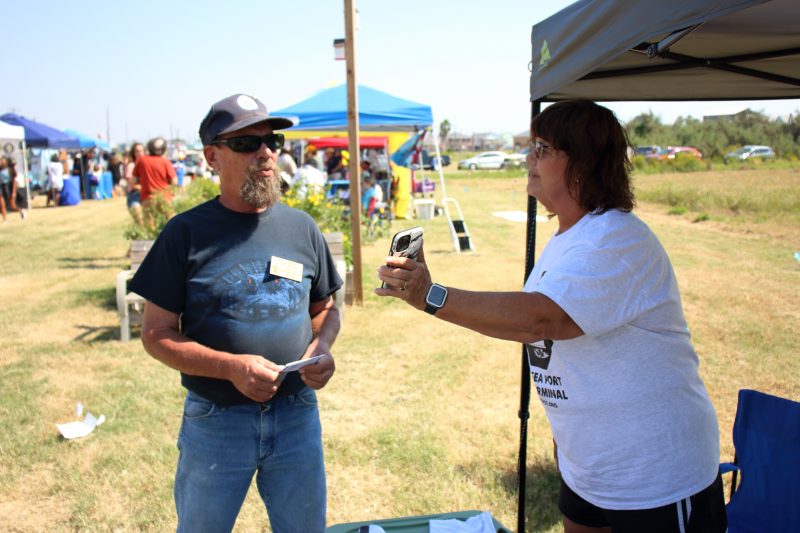
Pam Harris, right, shares information about the Sea Port Oil Terminal with Phil Huxford at the Nature Fest in Surfside Beach, Texas, on Oct. 8, 2022. Huxford, a Board Member of the Friends of Brazoria National Wildlife Refuge, wishes the project could find a different route. Keaton Peters/Reporting Texas
“I’m sure I’m not the most popular person on the island right now,” said Pam Harris, a real estate broker who lives in Surfside Beach and has been involved in organizing against the project. “It’s not over until it’s really over, and I’m going to keep speaking up.”
Harris joined members of Texas Campaign for the Environment and Citizens for Clean Air and Clean Water to set up a booth under the banner “Stop SPOT” at the Surfside Beach Nature Fest on October 8.
The Nature Fest was hardly the first such event for Surfside Beach resident Sue Page. She also attended the very first Earth Day celebration as a child in 1970 and had a career in education before retiring in Surfside Beach two years ago.
“I feel a sense of responsibility toward the Earth,” Page said.
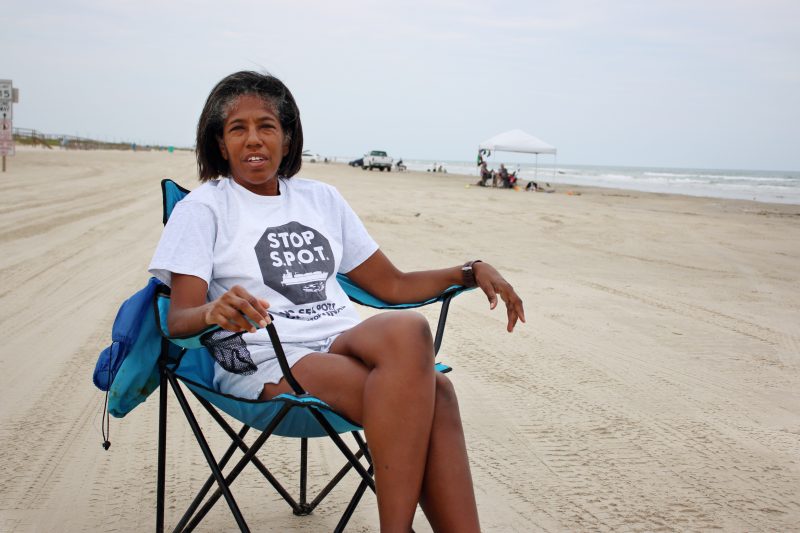
Sitting on the beach behind her Surfside, Texas, home, Sue Page talks about rallying her neighbors to stop the Sea Port Oil Terminal from being built about 27 nautical miles offshore. Keaton Peters/Reporting Texas
Sitting on the beach behind her home, Page said she has fears “there’s going to be a leak whether it’s minuscule or major.”
“I don’t want to be a sacrifice area,” she said, adding that with heavy industry already prominent in the area, she wants to “give our land, our water, our beach a rest.”
Harris and Page were not the only residents hoping SPOT would be rejected, but most see the project as inevitable, including Wilson who criticized “out-of-state environmentalists” getting involved in the issue.
“I don’t look to tree huggers and turtle lovers,” Wilson said.
In an effort to bring both sides together, Surfside Beach alderman Jonathan Gerber has invited officials from Enterprise to a public meeting to speak directly to concerned citizens.
“I want people to have the opportunity to know what’s going on,” Gerber said. But Enterprise has yet to answer the invitation.
Rick Rainey, a spokesperson for Enterprise, also declined multiple requests for comment from Reporting Texas.
“Those big companies, they do whatever they want to when they want to and why they want to. They don’t really care about what we want to do,” another village alderman Bob Petty told Reporting Texas.
Gerber expects the Maritime Administration to approve the permit and hopes Enterprise, Enbridge and Chevron will be “responsible corporate partners” with the village.
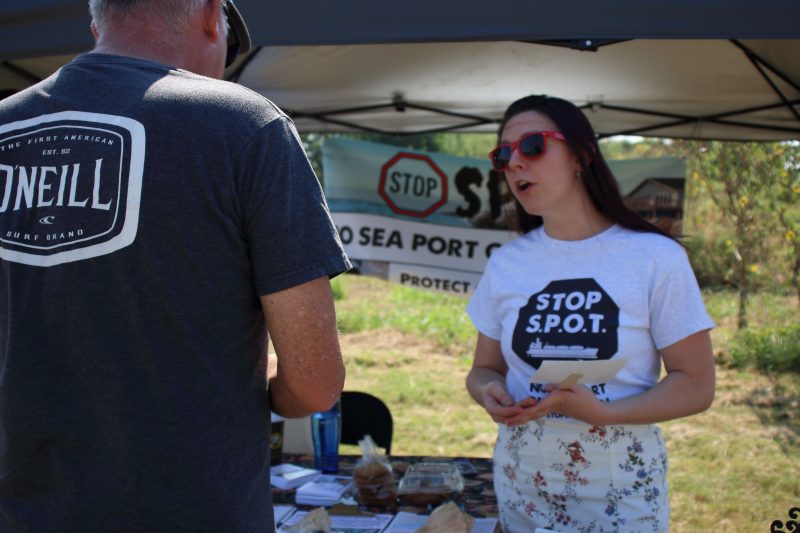
Texas Campaign for the Environment staff member Katherine Hahn, right, talks to Deric Herbert about the Sea Port Oil Terminal at the Nature Fest in Surfside Beach, Texas, on Oct. 8, 2022. Herbert said he hoped money from the project could fix Surfside Beach’s sewer system but was concerned about the risk of oil spills. Keaton Peters/Reporting Texas
Back at the Nature Fest, Surfside Beach resident Deric Herbert didn’t want an oil pipeline going through the village, but he hoped a “revenue stream” from the pipeline could fix problems with the city’s water and bring more of the island onto the same sewer system. About half the island is using decentralized septic systems, according to Herbert.
A short walk down the road from where the pipeline would cross the island, Aimee Miller said her home’s water is “unusable” for drinking or cooking.
“We have enough pipelines. We’re already polluting enough,” Miller said.
Surfside Beach Mayor Greg Bisso did not respond to Reporting Texas’ multiple requests for comment on how the Sea Port Oil Terminal would impact the village.
The Maritime Administration is expected to make a final decision on the permit by Nov. 21, according to Amy Dinn, an attorney with Lone Star Legal Aid who assisted groups submitting public comments to the permit application.